Overview
You know, when it comes to smart vending machines, the price tag isn't just a random number. It’s shaped by ten key factors. Think about things like:
- secure transactions
- verified sellers
- installation costs
- digital payment processing fees
- ongoing maintenance expenses
Here’s the thing: all these elements play a big role in both your initial investment and how profitable your vending machine venture can be down the line. For instance, features like cashless payments and boosted customer trust can really justify those higher prices.
So, if you’re diving into this world, keep these factors in mind. They’re not just technical details; they’re part of the bigger picture that can help you make a smart choice.
Introduction
You know how retail technology is constantly changing? Well, smart vending machines are a perfect example of that shift, changing how we interact with automated sales. As these high-tech machines become more popular, it’s crucial for both buyers and sellers to understand what affects their pricing.
Let’s break it down. There are several key factors at play, like:
- Secure transaction systems
- Verified sellers
- Ongoing maintenance costs
- Market trends
How do these elements influence how we perceive value and profitability in this fast-evolving landscape?
Exploring these questions not only highlights the complexities of pricing but also uncovers opportunities to maximize returns in this innovative sector. So, if you’re looking to dive deeper into the world of smart vending machines, you’re in the right place!
Vending Village: Secure Transactions and Verified Sellers Impacting Smart Vending Machine Prices
Have you ever thought about how important trust is in retail? The Village of Automated Retail really gets this. They make secure transactions a priority and ensure that sellers are authenticated. This is huge when it comes to determining the smart vending machine price for those dispensing units. Buyers are more willing to pay a bit extra for spots that guarantee safety and legitimacy. Why? Because that trust helps ease the worries about scams and misleading listings.
And here’s the thing: the platform has an escrow system that boosts buyer confidence even more. Funds are only released once the buyer is happy with their purchase. This not only makes the buying experience smoother but also allows sellers to set competitive prices for verified listings.
Just listen to what some users are saying. One location agent shares, "Vending Village has seriously transformed our business. We're way more productive and seeing great results." Another user appreciates the hassle-free experience, especially with a full refund guarantee.
Case studies back this up too. Operators using verified locations often see a nice bump in their profit margins when they consider the smart vending machine price. Some are raking in over $1,600 a month from well-placed devices! Plus, snack dispenser rentals can hit profit margins of 50%. That’s some serious financial upside.
As the cashless retail market is projected to grow at a 12.2% CAGR from 2025 to 2033, thanks to tech advances and a consumer preference for convenience, the impact of verified sellers on pricing is only going to get stronger. So, if you’re in this space, it’s worth considering how verification can elevate your business.
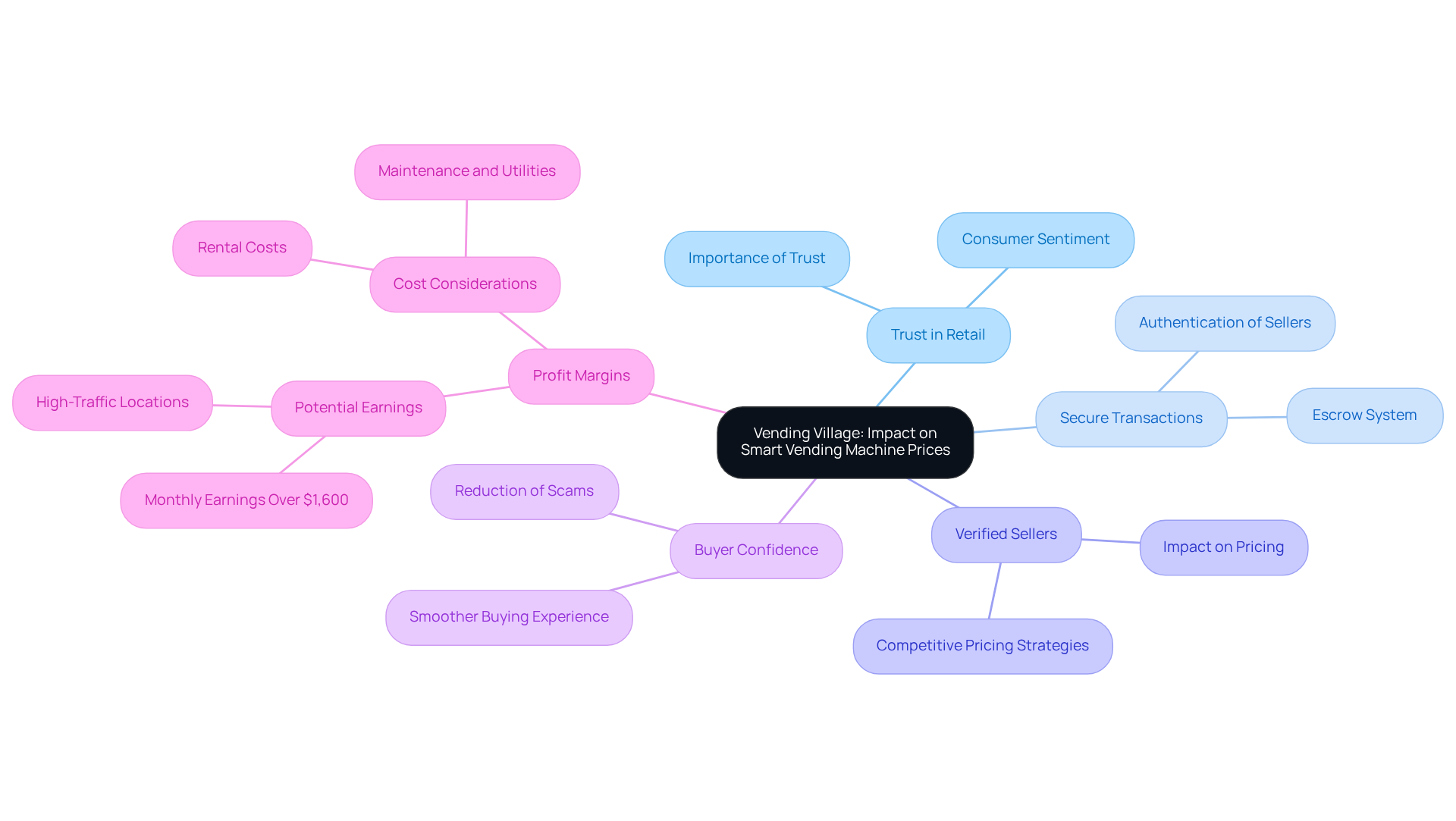
Initial Purchase and Installation Costs of Smart Vending Machines
When you're looking at smart vending devices, the smart vending machine price usually falls between $3,000 and $10,000. This range depends on the features and technology you choose. The smart vending machine price for full-service devices typically ranges from $3,000 to $6,000, while combo units generally have a price between $2,500 and $5,000.
Now, don’t forget about installation costs! These can add anywhere from $100 to $600 to your total investment, depending on how complicated the setup is and what your location needs. It's super important to factor in these expenses since they can really impact your overall return on investment (ROI) and how you price the items you sell through these machines.
Here’s the thing: if your equipment is in great shape and you don’t foresee any repairs, you can enjoy better reliability, which means fewer surprise maintenance costs. Plus, ongoing upkeep usually runs about 5-10% of the equipment’s initial cost each year. So, it’s crucial to understand these financial details to make smart choices that boost your profitability in this business.
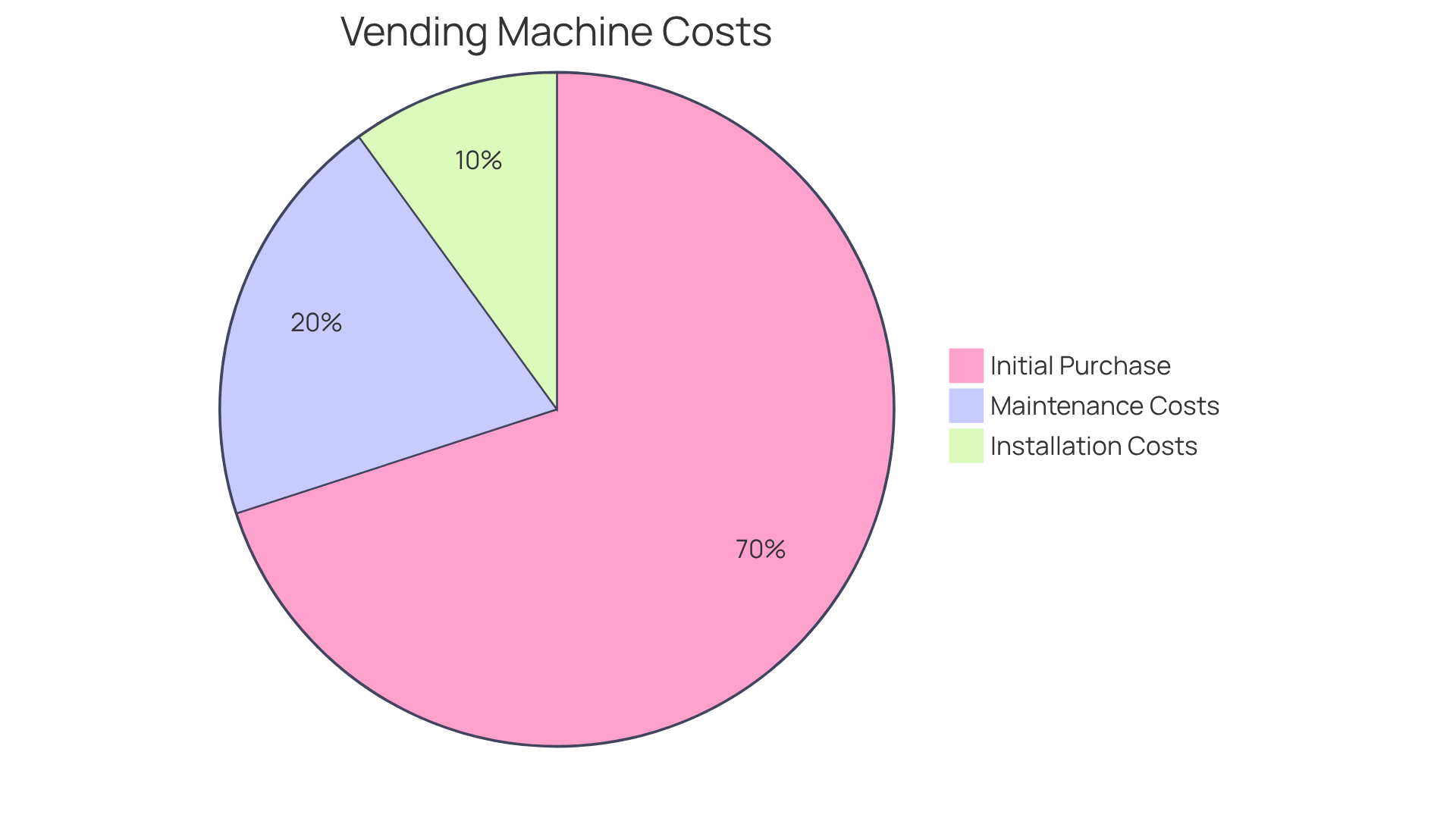
Digital Payment Processing Fees Affecting Smart Vending Machine Pricing
Smart vending machines are increasingly using digital payment systems, and let’s be real: those systems often come with processing fees that can hit between 2.5% and 5% per transaction. That can really add up, especially in busy spots where people are spending more. For example, if something costs $2.00, managers might have to bump it up to $2.05 or even $2.10 just to cover those fees. This change can really shift how customers see value.
Now, here’s the good news: at Vending Village, sellers enjoy a clear fee structure. Listing your location and services? Totally free. But when a sale happens, there’s a 20% platform fee (with a minimum of $100) and a 3% transaction fee for credit card processing. So, if a location sells for $1,000, the seller walks away with $770 after fees. Understanding these costs is crucial for managers as they navigate pricing strategies in a competitive market.
Let’s break it down: case studies show that adding cashless payment options can actually boost average transaction values. In 2022, the average cashless vending transaction was $2.24, while cash purchases averaged $1.78. This tells us that customers are willing to spend more when they use card payments. So, while those transaction fees might seem daunting, they can be offset by higher sales volumes and increased spending.
But wait, there’s more! Managers should also think about the long-term perks of cashless systems. You’ll see lower labor costs and fewer service visits since cash handling is out of the picture. Industry experts point out that servicing technology becomes way less expensive when you’re not dealing with cash, which helps businesses stay profitable even with those pesky transaction fees. So, while these fees matter in pricing strategies, the overall revenue impact can actually be positive if managed well.
When buyers make payments, Vending Village processes them through a secure payment system, holding funds until both parties confirm the transaction was successful. After that, money gets transferred to the seller’s bank account within 5 business days. Vending Village is committed to secure payment processing through partnerships with trusted providers like Stripe, ensuring that financial transactions are safe and sound. David’s vision for Vending Village came from recognizing the need for a secure marketplace for kiosk and location owners, making it an essential resource in the industry.
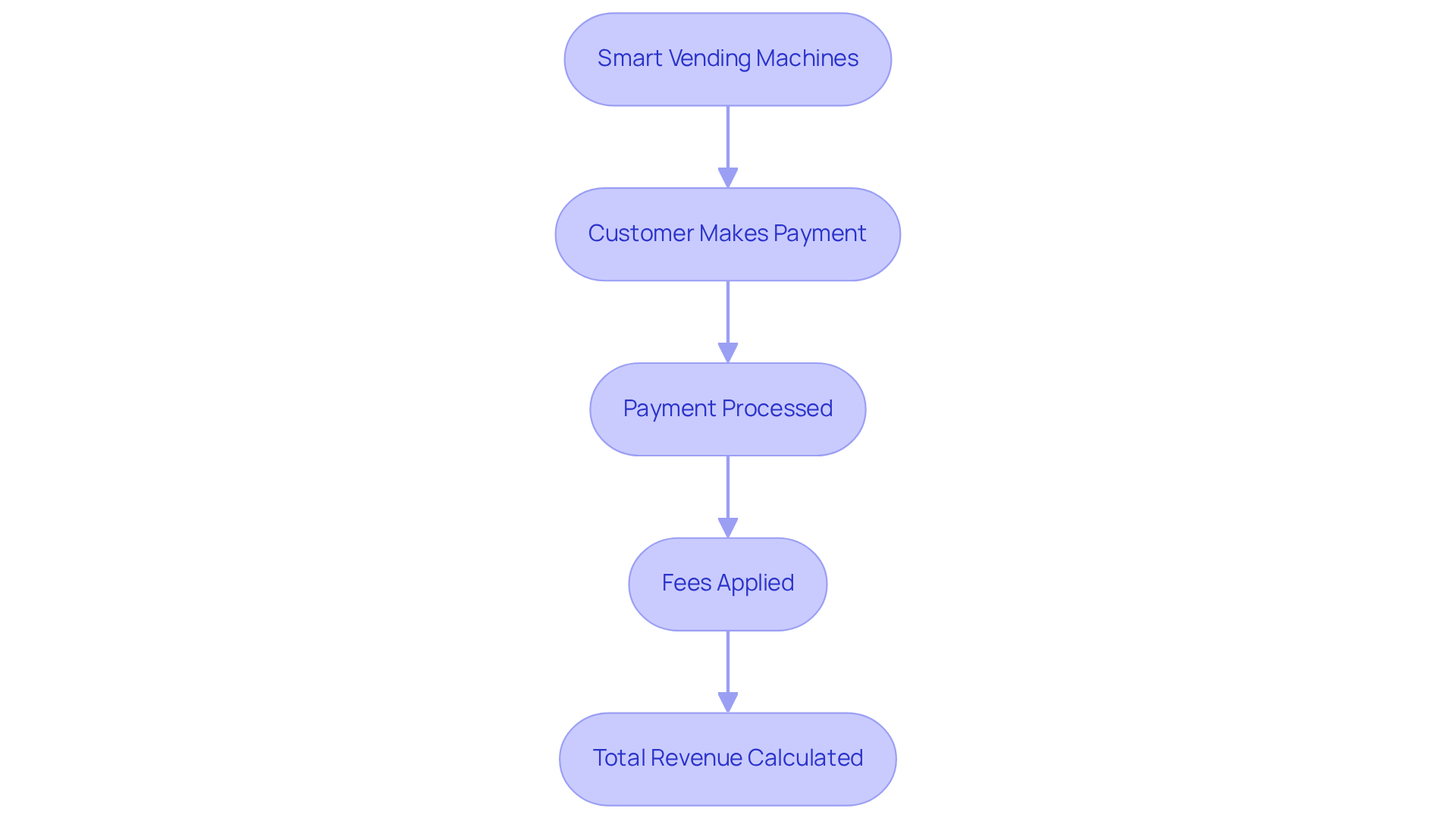
Maintenance and Software Update Expenses for Smart Vending Machines
When it comes to smart vending machines, maintenance expenses can really vary. You’re looking at anywhere from $100 to $500 each year, depending on how complex the machine is and how much it gets used. But don’t forget about software updates! Those can add another $200 to $600 annually, thanks to licensing fees or subscriptions.
These costs are super important when you're calculating the smart vending machine price. They can directly affect your profitability and the smart vending machine price strategies. For instance, Tom, who runs a snack vending business, emphasizes that keeping up with software updates can really boost operational efficiency, which ultimately leads to higher revenue. He puts it simply: "Investing in software updates is crucial for ensuring equipment runs efficiently and maximizing profits."
So, understanding these expenses is key for property managers who want to navigate the financial landscape of vending investments. It’s all about knowing what you’re getting into.
To get a clearer picture of your ongoing costs—like maintenance and software updates—check out case studies like the 'Operational Expenses Breakdown.' And here’s a tip: keep a checklist for your machines. Make sure you’re cleaning them, inspecting for damages, and updating the software regularly. This can help you manage those costs more effectively.
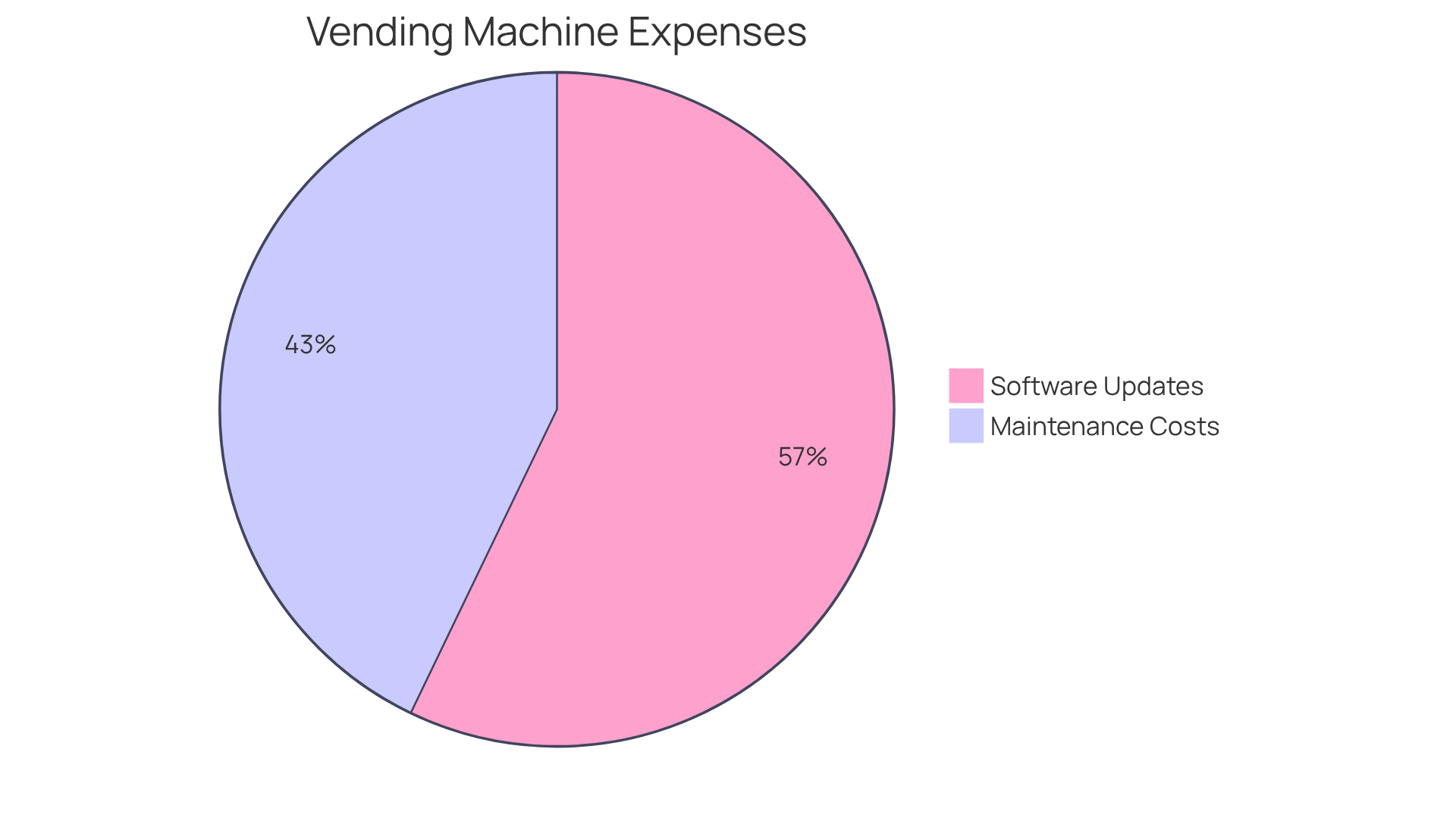
Network Connectivity Costs for Smart Vending Machines
You know how important it is to have reliable network connectivity for smart machines, right? Whether it’s through Wi-Fi, 4G, or Ethernet, a solid connection is key. Monthly costs for connectivity can range from about $20 to $100, depending on your service provider and data plan. It’s something you definitely want to factor into the smart vending machine price. After all, a stable connection is essential for real-time inventory tracking and smooth transactions.
Here’s the thing: good connectivity doesn’t just make things easier; it also enhances the customer experience and boosts your operational efficiency. For instance, companies using automated dispensing solutions often see lower labor costs and increased sales from cashless payments. That really highlights how crucial dependable connectivity is for optimizing profits.
But don’t forget, regular maintenance and timely software updates are vital for keeping everything secure and compliant with payment regulations. This just reinforces the need for a strong network infrastructure. As Marta Cano puts it, "Intelligent kiosks offer companies an automated, cashless, and data-informed method for sales."
So, what can you do? To ensure everything runs smoothly, take the time to evaluate your connectivity options carefully. And remember to consider the overall investment when setting the smart vending machine price. It’s all about making informed choices that lead to better outcomes!
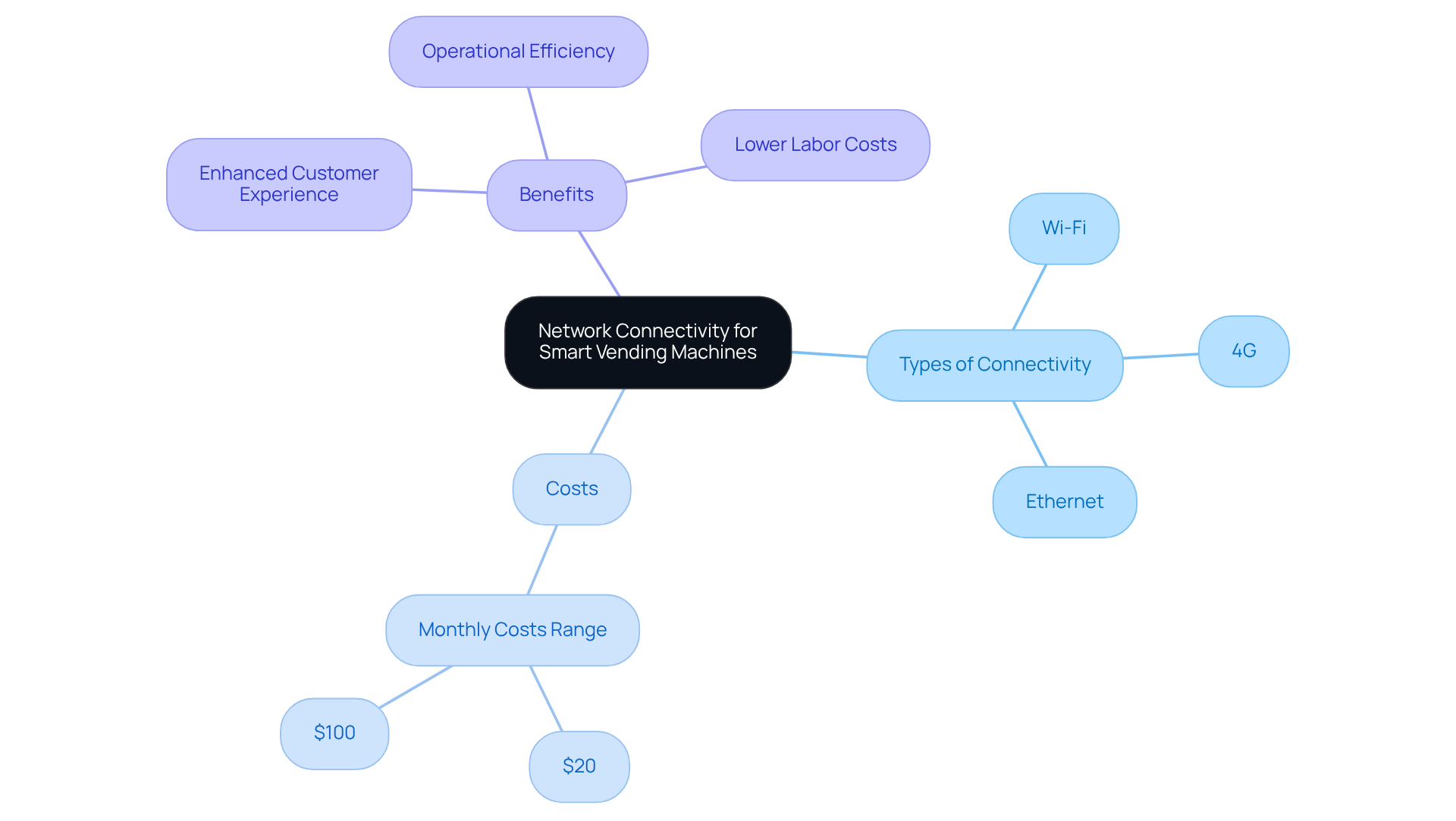
Stocking and Restocking Expenses of Smart Vending Machines
Restocking smart vending machines can really add up, can’t it? You’re looking at the smart vending machine price, which usually ranges from $50 to $200 per restock, depending on what products you offer. So, it’s crucial to think about the smart vending machine price, how often you restock, and what you’re selling. High-demand items, for instance, need more frequent restocking, which can drive up your costs. And that might mean you have to adjust the smart vending machine price to keep things profitable.
Here’s a real-world example: one machine owner took a close look at product demand trends and adjusted their restocking schedule. The result? They cut costs by 15% while still keeping products available. This just goes to show how important it is to understand what consumers want and how seasonal changes can affect your restocking expenses.
Industry leaders have a lot to say about being adaptable with pricing. Charles Darwin once said, "It is not the strongest of the species that survives, nor the most intelligent. It is the one that is most adaptable to change." This couldn’t be more relevant in retail. Being responsive to what your customers want can significantly influence your pricing strategies, including the smart vending machine price and restocking costs. By using data to guide your decisions, you can navigate the complexities of restocking expenses and keep your vending machines competitive and profitable.
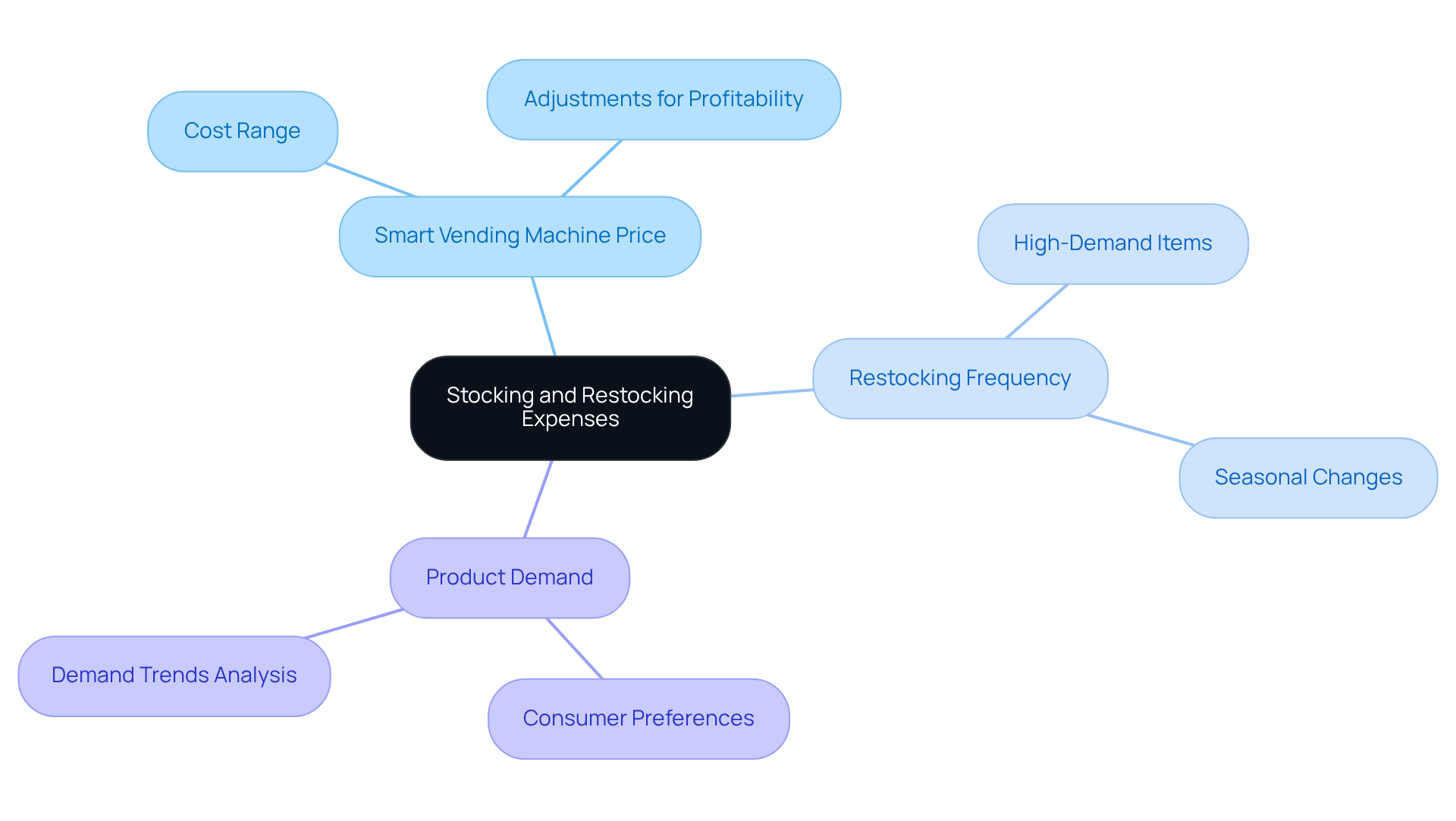
Benefits of Smart Vending Technology Justifying Higher Prices
You know those intelligent kiosks popping up everywhere? They really pack a punch when it comes to benefits, and that’s why the smart vending machine price can be on the higher side. Think about it: features like cashless payment options, real-time inventory tracking, and personalized marketing can really amp up customer engagement. For example, kiosks that accept mobile payments and offer loyalty rewards don’t just cater to what today’s consumers want; they also drive sales.
Studies show that people are more than willing to pay a little extra for these conveniences, especially in busy places like offices. The rise of cashless payment methods, whether it’s credit cards or mobile payments, is a game changer, boosting revenue by meeting the demand for contactless transactions. Take Vending Village’s secure payment system, for instance. By teaming up with trusted payment gateways like Stripe, they ensure that transactions are safe, only releasing payments once both buyer and seller give the thumbs up.
And it doesn’t stop there. With the ability to keep an eye on stock levels and get automatic restocking alerts via a cloud-based dashboard, managing inventory becomes a breeze. This kind of operational efficiency not only enhances the user experience but also contributes to the overall profitability of automated sales. Investing in smart technology? Definitely a wise move.
As Marta Cano points out, traditional dispensers that rely on cash can limit sales potential. That’s why jumping on board with Vending Village’s secure payment system is crucial for modern retail solutions. If you’re a property manager considering this investment, it’s smart to look at the smart vending machine price and the potential return on investment (ROI) for these intelligent dispensing units. By evaluating factors like increased sales from cashless transactions and improved operational efficiency, you can make a well-informed decision.
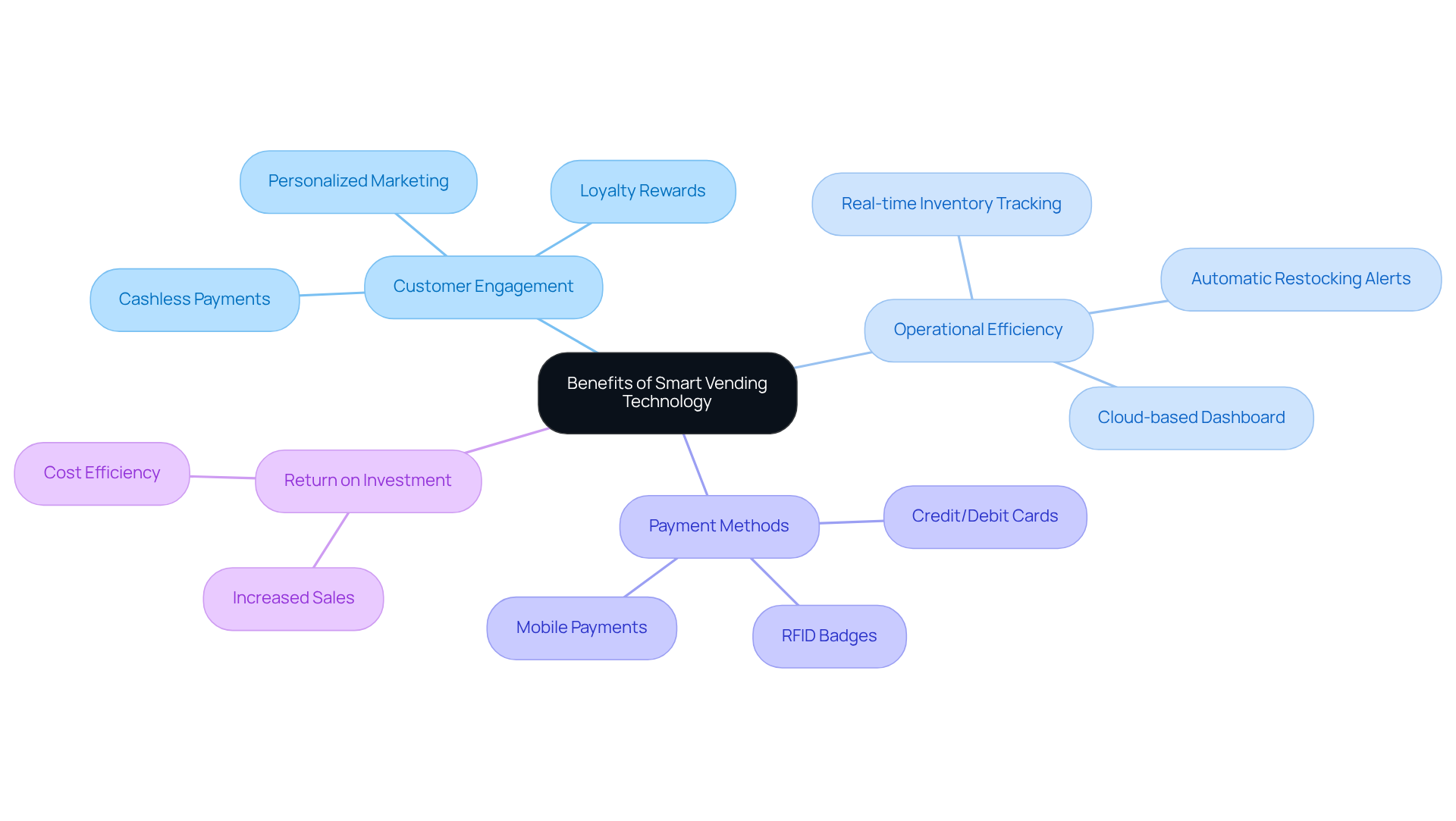
Return on Investment (ROI) Potential of Smart Vending Machines
When it comes to intelligent kiosks, the return on investment (ROI) usually sits between 20% and 40%. This can really depend on where you place your kiosk and what products you choose. To maximize your investment, it’s crucial to analyze potential earnings in relation to both your startup costs and the smart vending machine price, along with ongoing expenses. For instance, consider a dispensing unit that pulls in between $200 and $800 a month. That range really shows how important it is to think strategically about positioning and product selection to hit that positive ROI. With solid returns, you can even justify charging more for premium products, boosting your profits.
Now, let’s look at a real-life example. Picture a cotton candy vending machine in a bustling mall. It averages about 40 sales a day at $8 each, totaling a monthly revenue of $9,600. After factoring in product costs and commissions, you’re left with a net profit of around $4,800. That’s a great opportunity for earnings, especially when you’ve got the right spot. But don’t forget to consider your monthly inventory restocking costs, which can range from $250 to $500. This is key when figuring out your ROI and keeping expenses in check.
Understanding smart vending machine price strategies is also super important. You could try bundle deals, set premium prices for convenience, or even use dynamic pricing based on real-time data to boost sales. By regularly checking your performance and adjusting your pricing, you can really ramp up your ROI over time. Plus, keep an eye out for hidden costs that come with owning automated dispensers, like equipment wear and tear or credit card transaction fees. These are crucial for getting a complete picture of your ROI.
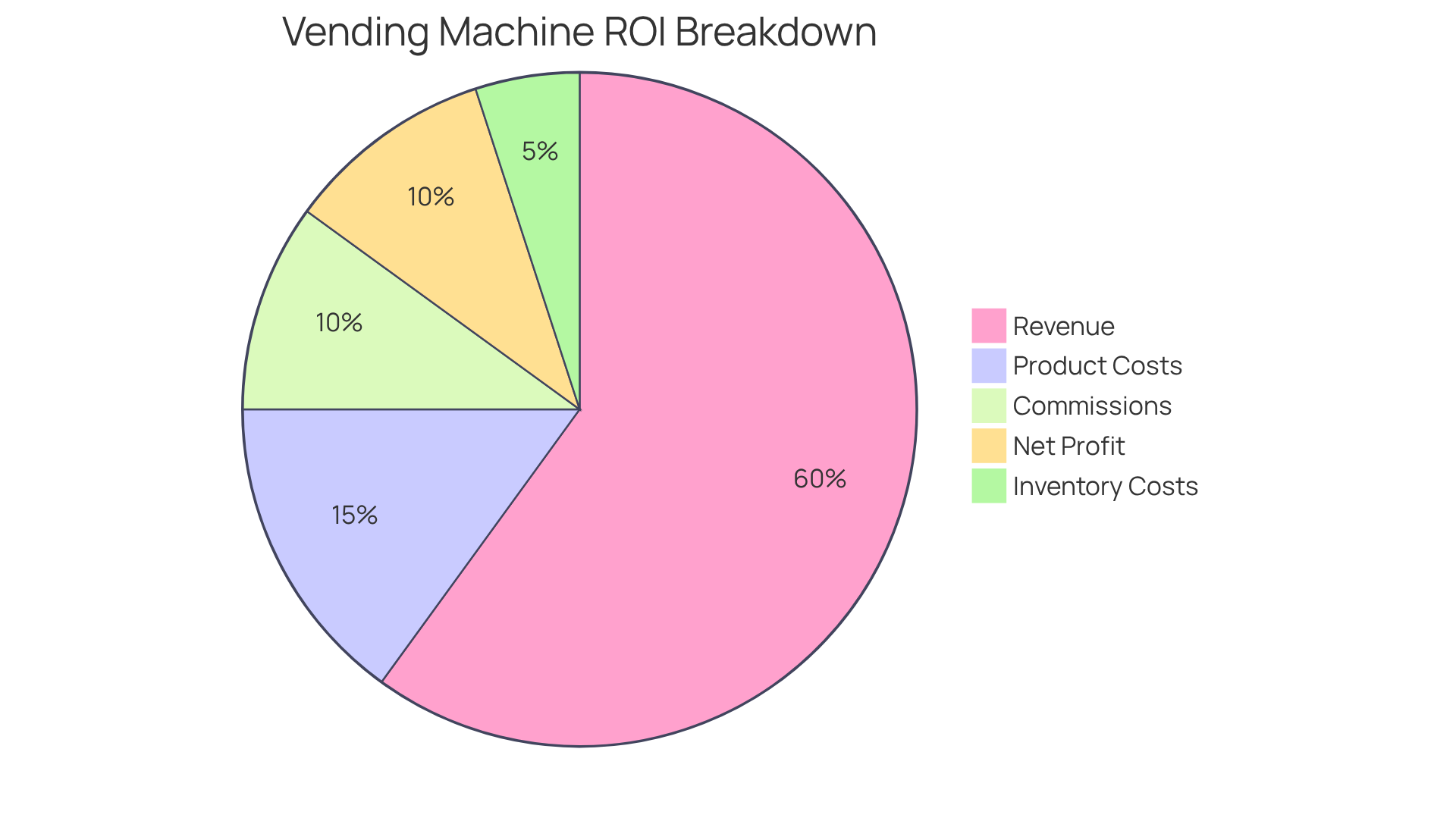
Pros and Cons of Smart Vending Machines Affecting Price Perception
Smart vending machines are pretty cool, right? They bring a level of convenience and advanced features that can really make life easier. But here's the catch: the smart vending machine price often reflects higher initial costs and the potential for some tech hiccups.
So, why would consumers be willing to pay a higher smart vending machine price? Well, many find the smart vending machine price worth it for the added convenience, especially when they hear from folks like Carlisa Williams, a location specialist who calls Vending Village a 'total game changer.'
Now, I get it—bad experiences with tech can leave a sour taste. But Vending Village is all about making things easy, with a focus on hassle-free refunds and secure transactions. This approach really puts both providers and consumers at ease.
And here’s the good news: this commitment, paired with positive testimonials from seasoned pros, helps people communicate the real value of these smart features.
So, if you’re considering making the switch, just remember that addressing any concerns upfront can go a long way in showing the benefits.
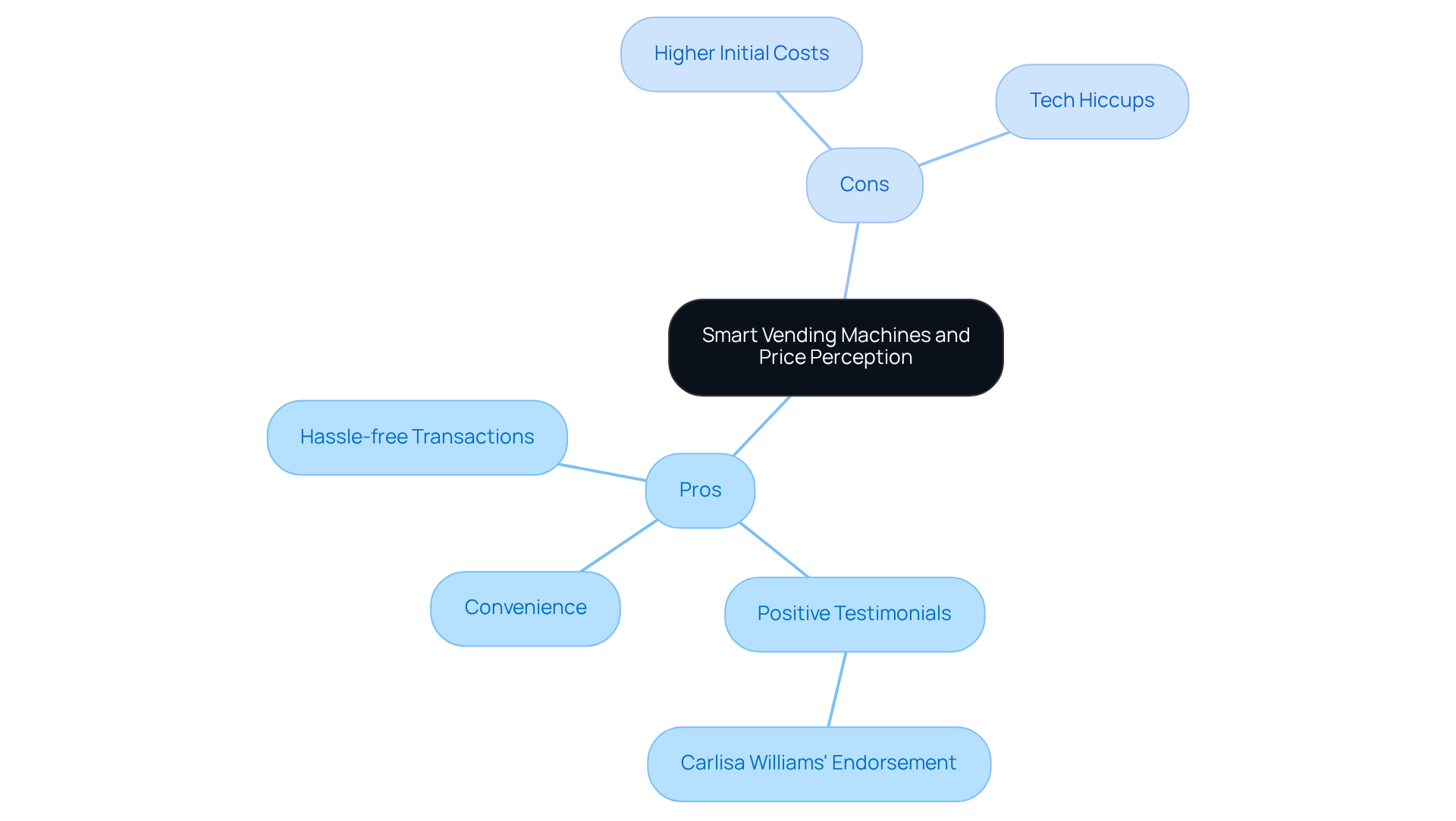
Market Trends and Consumer Demand Influencing Smart Vending Machine Prices
You know how we’re all looking for convenience these days? Well, current market trends show a big shift towards intelligent dispensing units that come with cashless payment options and personalized user experiences. As consumers prioritize ease and tech integration, this opens up some exciting opportunities for providers to rethink their pricing strategies, particularly concerning smart vending machine price.
Machines that cater to these changing preferences can actually command a higher smart vending machine price. It’s all about the value they offer! For example, the cashless vending machine market is expected to grow at a compound annual growth rate (CAGR) of 12.2% from 2025 to 2033. That growth is fueled by the increasing demand for contactless transactions and advanced features.
So, here’s the thing: staying in the loop about market dynamics is crucial. It allows businesses to proactively adjust their pricing strategies, helping them stay competitive while also maximizing profits. Plus, case studies show that operators who embrace these innovations not only boost customer satisfaction but also position themselves well in a fast-changing marketplace.
Isn’t it time to consider how you can adapt to these trends? Let’s keep the conversation going and explore how these changes can work for you!
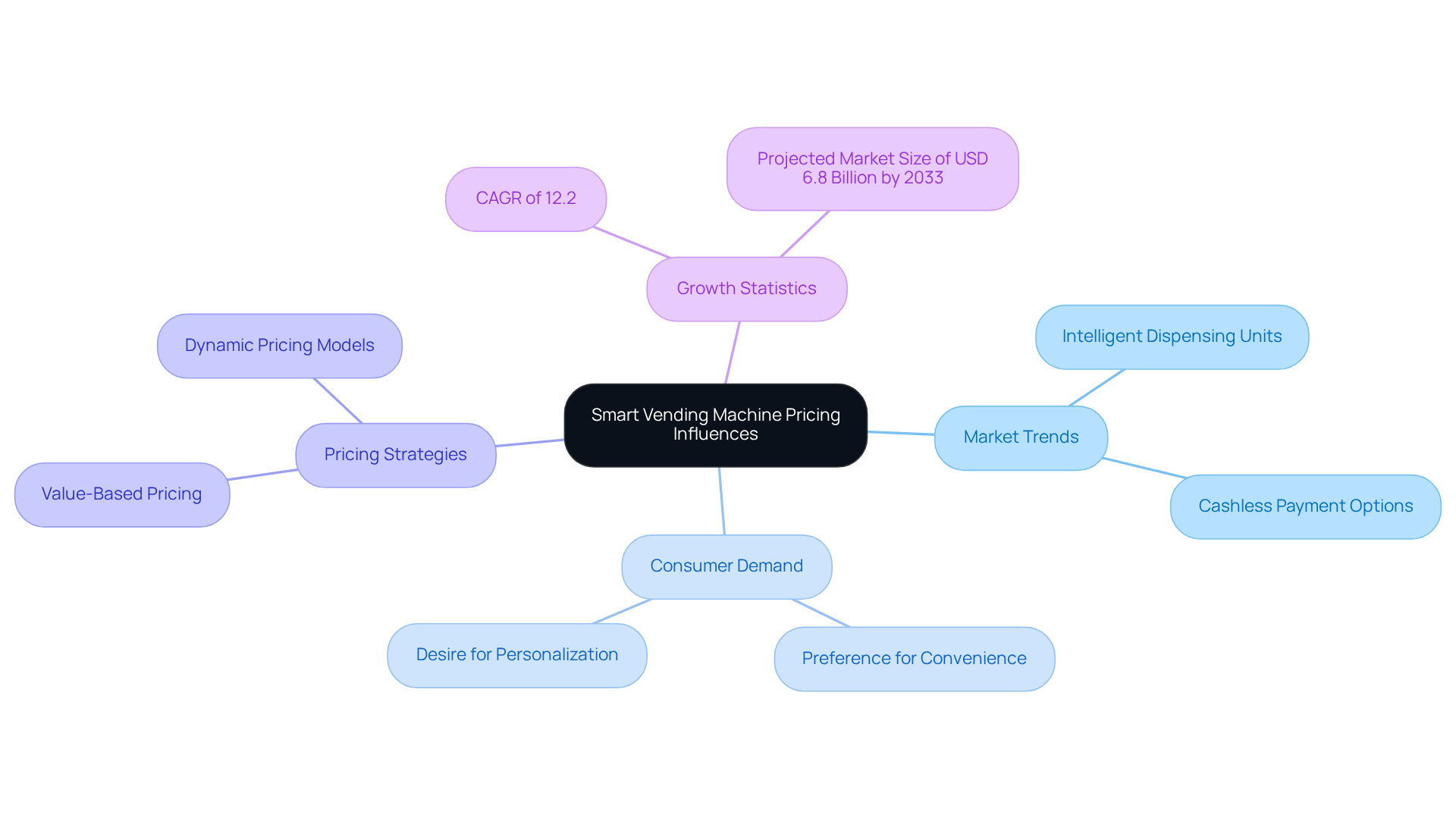
Conclusion
Let’s talk about smart vending machine pricing. It’s a bit of a maze, isn’t it? You’ve got technology, trust, and market dynamics all playing their part. If you’re thinking about investing in or managing these machines, getting a grip on these factors is key. The insights here show how things like secure transactions, verified sellers, initial costs, and ongoing expenses come together to shape pricing.
Here’s the thing: secure platforms like Vending Village really boost buyer confidence. When buyers trust the platform, sellers can charge better prices. And we can’t forget about the costs that come with digital payment processing, maintenance, and connectivity. These directly impact profitability and pricing strategies. Plus, with more consumers looking for convenience, it’s no surprise that smart vending machines can command higher price points. Operators who keep up with these trends can find valuable opportunities.
So, what’s the takeaway? Staying on top of market trends and consumer preferences is crucial for making the most of smart vending machines. By using insights on pricing strategies and operational efficiencies, you can not only sharpen your competitive edge but also meet the needs of today’s tech-savvy consumers. Embracing these changes can lead to a more profitable and sustainable vending operation. It’s definitely worth considering how to weave these factors into your future business plans.
Frequently Asked Questions
What is the importance of trust in retail according to the article?
Trust is crucial in retail as it influences buyers' willingness to pay more for secure and legitimate transactions, easing concerns about scams and misleading listings.
How does Vending Village enhance buyer confidence?
Vending Village enhances buyer confidence by implementing an escrow system where funds are only released once the buyer is satisfied with their purchase.
What benefits do users report from using Vending Village?
Users report increased productivity, great results, and a hassle-free experience, particularly appreciating the full refund guarantee.
What financial advantages can operators gain from verified locations?
Operators using verified locations often see increased profit margins, with some earning over $1,600 a month from well-placed devices and snack dispenser rentals achieving profit margins of 50%.
What are the initial purchase costs for smart vending machines?
The price for smart vending machines typically ranges from $3,000 to $10,000, depending on features, with full-service devices costing between $3,000 and $6,000 and combo units between $2,500 and $5,000.
What additional costs should be considered when purchasing smart vending machines?
Installation costs can add between $100 and $600 to the total investment, and ongoing maintenance usually costs about 5-10% of the equipment’s initial cost each year.
How do digital payment processing fees affect smart vending machine pricing?
Digital payment processing fees typically range from 2.5% to 5% per transaction, which can lead sellers to increase prices to cover these costs.
What is the fee structure for sellers at Vending Village?
Listing services is free, but sellers incur a 20% platform fee (minimum $100) and a 3% transaction fee for credit card processing on sales.
How do cashless payment options impact average transaction values?
Cashless payment options can boost average transaction values, with cashless transactions averaging $2.24 compared to $1.78 for cash purchases in 2022.
What advantages do cashless systems provide for vending machine operators?
Cashless systems lead to lower labor costs, fewer service visits, and reduced servicing expenses, contributing to overall profitability despite transaction fees.
How does Vending Village ensure secure payment processing?
Vending Village processes payments through a secure system that holds funds until both parties confirm a successful transaction, transferring money to the seller’s account within 5 business days.
List of Sources
- Vending Village: Secure Transactions and Verified Sellers Impacting Smart Vending Machine Prices
- Vending Machine Statistics and Facts (2025) (https://news.market.us/vending-machine-statistics)
- Vending Machine Rental: Key Strategies for Success and Profitability (https://blog.vendingvillage.com/vending-machine-rental-key-strategies-for-success-and-profitability)
- Cashless Vending Machine Market Size, Growth, Scope & Forecast Report - 2033 (https://datahorizzonresearch.com/cashless-vending-machine-market-22211)
- Initial Purchase and Installation Costs of Smart Vending Machines
- What Is the Cost of Using a Smart Vending Machine? (https://velocity-smart.com/velocity-hub/blog/what-is-the-cost-of-using-a-smart-vending-machine)
- Investment Insights: Analyzing Roi on Vending Machines (https://efinancialmodels.com/investment-insights-analyzing-roi-on-vending-machines)
- Vending Machine Statistics and Facts (2025) (https://news.market.us/vending-machine-statistics)
- What's the Average Vending Machine Cost | Primi Digital (https://primidigital.com/whats-the-average-vending-machine-cost)
- Digital Payment Processing Fees Affecting Smart Vending Machine Pricing
- Cashless Payments Are a Boon for Vending Machines (https://paymentsjournal.com/cashless-payments-are-a-boon-for-vending-machines)
- What Is the Cost of Using a Smart Vending Machine? (https://velocity-smart.com/velocity-hub/blog/what-is-the-cost-of-using-a-smart-vending-machine)
- Vending Machines With Credit Card Readers And Mobile Payments (https://bottomsupvend.com/vending-machines-with-credit-card-readers-and-mobile-payments)
- How Do Vending Machines Accept Payments Today? (https://dfyvending.com/vending-machine-payment-methods)
- Cashless drives small transaction sales in vending, amusements (https://vendingtimes.com/news/cashless-drives-small-transaction-sales-in-vending-amusements)
- Maintenance and Software Update Expenses for Smart Vending Machines
- Investment Insights: Analyzing Roi on Vending Machines (https://efinancialmodels.com/investment-insights-analyzing-roi-on-vending-machines)
- Network Connectivity Costs for Smart Vending Machines
- What Is the Cost of Using a Smart Vending Machine? (https://velocity-smart.com/velocity-hub/blog/what-is-the-cost-of-using-a-smart-vending-machine)
- Stocking and Restocking Expenses of Smart Vending Machines
- RFID for the Supply Chain and Operations Professional, [Second ed.] 9781631574634, 1631574639 - DOKUMEN.PUB (https://dokumen.pub/rfid-for-the-supply-chain-and-operations-professional-secondnbsped-9781631574634-1631574639.html)
- 6 Motivational Quotes to Help You Get Organized with Finale Inventory | Ecommerce (https://finaleinventory.com/inventory-management/6-motivational-quotes-to-help-you-get-organized-with)
- Benefits of Smart Vending Technology Justifying Higher Prices
- The Benefits of Owning a Smart Vending Machine (https://velocity-smart.com/velocity-hub/blog/the-benefits-of-owning-a-smart-vending-machine)
- Return on Investment (ROI) Potential of Smart Vending Machines
- How Do I Measure the ROI of an Interactive Vending Machine? (https://vending-machines.ie/how-do-i-measure-the-roi-of-an-interactive-vending-machine)
- Investment Insights: Analyzing Roi on Vending Machines (https://efinancialmodels.com/investment-insights-analyzing-roi-on-vending-machines)
- How Profitable Is Owning a Vending Machine? A 2025 ROI Guide (https://widermatrix.com/how-profitable-is-owning-a-vending-machine-a-2025-roi-guide)
- The Truth About Vending Machine ROI: Success Rates with Expert Support (https://dfyvending.com/vending-machine-roi-expert-support)
- Market Trends and Consumer Demand Influencing Smart Vending Machine Prices
- Cashless Vending Machine Market Size, Growth, Scope & Forecast Report - 2033 (https://datahorizzonresearch.com/cashless-vending-machine-market-22211)
- Expert reveals future of vending machines in revolutionary insights. (https://digitalmediavending.com/expert-reveals-future-of-vending-machines-in-revolutionary-insights)
- U.S. Retail Vending Machine Market | Industry Report, 2033 (https://grandviewresearch.com/industry-analysis/us-retail-vending-machine-market-report)
- Smart Vending Machine Market Size, Share & Demand 2034 (https://marketresearchfuture.com/reports/smart-vending-machine-market-32574)




